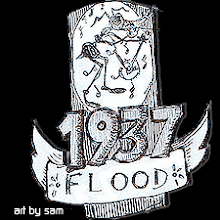Often at rehearsals, between tunes we’re planning to work on, Doug Chaffin will just start playing a song that’s been on his mind, and lately that tune has been a sweet antebellum melody called “Lorena.”
Now, while the song is of decidedly Northern origins — it was written in Zanesville, Ohio, five years before the Civil War by a young man devastated by a broken engagement with his sweetheart — “Lorena” was equally loved by homesick southerners during the war. In fact, we know from diaries and letters that both sides claimed it as their own.
Meanwhile, the song has special meaning for history lovers in our part of the world, because the final resting place for the subject of that lovely ballad — Martha Ella Blocksom, later Ella Johnson — is just across the river from us here, at Woodland Cemetery in Ironton, Ohio.
So here, from a recent rehearsal, are Doug, Sam and Veezy contemplating this hauntingly beautiful melody that comes down to us from more than a century and a half ago.




